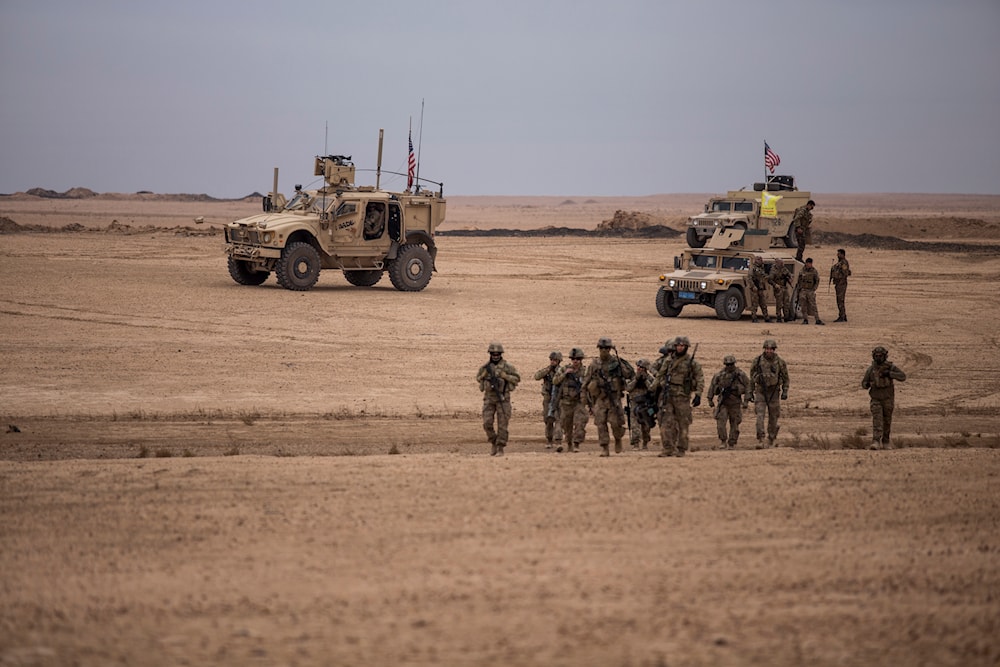Why the US should leave Syria: War on the Rocks
A commentary on War on the Rocks discusses how the US deviated from its main goal in fighting ISIS and focuses on why the US must revert to its intended goal.
-

American soldier walk in the countryside with US-backed SDF of Deir Ezzor in northeastern Syria, Wednesday, Dec. 8, 2021(AP)
A Commentary by Thanassis Cambanis on War on the Rocks titled "Leave Syria, Keep Fighting the Islamic State" sheds light on how the daily attacks from the Axis of Resistance have made life hell for the US troops in Syria and Iraq. It mentions how last month's attack is a clear reminder of the dangers with three service personnel dying.
The commentary states that even though the United States has had years to plan a well-organized withdrawal, it has not done so yet. It's currently a matter of months or at best a year, before the United States exits from Syria instead of keeping its troops' lives at constant risk. It further explains that the latter is tied to the results of the upcoming elections as if Donald Trump wins, it's possible he would proceed with his October 2019 effort of stopping the Syria mission. On the other hand, if Biden wins the commentator believes that "although he’s sleepwalking the United States deeper into a regional war," would have to weigh the constant loss of US lives as he does not want it.
Read more: Pentagon official: US forces attacked 169 times in Syria, Iraq, Jordan
The key is fighting terrorism as a main focus
It urged the US government and its allies to prioritize the main objective that allegedly brought US troops to Syria in the first place: the Islamic State. On one hand, some alarmists and supporters of an open-ended US presence have deceitfully alleged that the Islamic State is "as strong as ever." On the other hand, others, including the Iraqi government, have excessively dismissed the possibility of the presence of the exaggerated number of "50,000 committed terrorists" in al-Hol ever causing problems again.
It further stressed the United States to come to terms with its real priorities and "make the hard tradeoffs," stressing that the American forces are in Syria and Iraq for a purpose different than fighting Iran, and it is countering the Islamic State(ISIS). Hence, it’s time for the United States to stop all other points pulling it into "unwinnable local conflicts" and instead direct all of its energy toward fighting terrorism.
The commentary suggested the United States should work in parallel with Syria which wants to avoid the emergence of the Islamic State and negotiate a well-trusted plan for its government to have control over detention centers where ISIS members are held noting that the US already plans for an organized withdrawal from northeast Syria and a smaller presence in Iraq.
Related News: US official to Al Mayadeen: 118 operations on US bases in Syria & Iraq
As for Iraq, the commentary stated, that the United States should be open to taking "a hit to its prestige" by shrinking its military presence, in return for proceeding with intelligence and counter-terrorism cooperation with "security forces in federal Iraq as well as the Kurdistan Regional Government," adding that "The United States no longer occupies Iraq, and Iraq’s government includes a bevy of problematic militant factions." This means that Washington should be ready to make a deal declaring Iraq’s sovereignty rather than risk losing a crucial partner.
Further emphasizing the commentary highlighted that even though the United States does not possess any leverage to control either Syria or Iraq, it shares some common goals with them, and at least with Iraq, "a desire for a deep continuing security partnership." So, a lower arrangement can still effectively fight the Islamic State and possibly even eliminate many of the trigger points that "keep pulling the United States into a regional war."
The commentary ends by stressing that if the US is "willing to swallow the hit to American prestige" on one hand and work on its relationship with Iraq, on the other then it can possibly protect its alleged core mission while shrinking the US military presence in the Middle East.
Read more: Syrian military statement: US occupation cannot persist

 4 Min Read
4 Min Read








